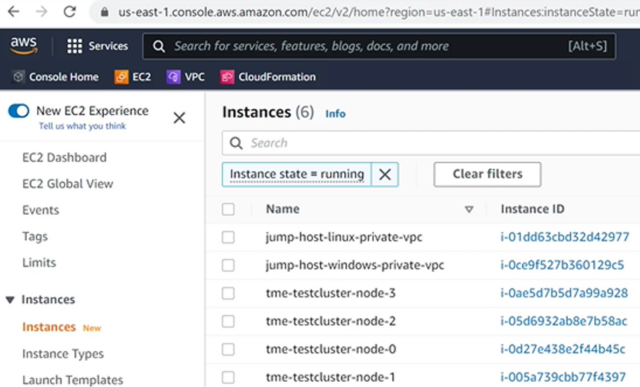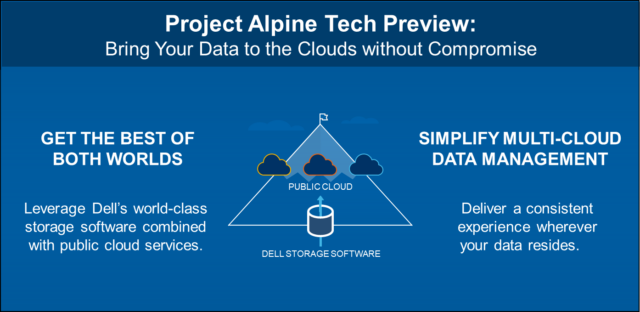Bring Your Data to the Clouds without Compromise
One of the top challenges I hear from customers is that their data is just too hard to manage and move as it continues to grow and become more dispersed across on-prem data centers, colocation facilities and public clouds. There is not much consistency between these environments resulting in unpredictable costs, concerns around security and governance, and the added people challenge of having enough talent with the right skills to manage it all. How do you achieve consistent operations from on-prem to multiple clouds?
Dell’s answer to this is Project Alpine. Announced earlier this year, Project Alpine is about delivering our flagship file, block and object storage software in all the major hyperscalers – AWS, Microsoft Azure and Google Cloud – and bringing operational consistency across environments. I am excited to give you a sneak peek into the experience Project Alpine will bring.
This week at Dell Technologies World, we are previewing implementations of our storage software running in public clouds. This will enable multi-cloud use cases that combine your favorite public cloud services with Dell’s enterprise data services (e.g., high availability, scale out, deduplication). Best of all, Project Alpine brings seamless connectivity and a consistent experience to/from your PowerStore, PowerScale, PowerFlex and ObjectScale on-prem. All while including the same APIs and management tools you use today – no need to refactor applications or retrain your teams. You will be able to purchase Dell software as a native cloud service or via the public cloud marketplace using existing cloud credits.
Let’s take a look at some specific use cases.
Cloud Native App Test/Dev
Imagine you are using AWS for testing and development of a new cloud native application to increase the speed of delivery. However, you want to deploy the app on-premises for more predictable cost and security. With Project Alpine, you can combine Dell block storage software with Amazon EKS anywhere to gain this flexibility – build once, deploy anywhere with a consistent, streamlined experience.
Burst to Cloud for AI and Analytic Services
Bursting to cloud is very popular to take advantage of advanced AI and analytics services in the cloud. For example, a manufacturing facility may store video data on a local PowerScale and want to leverage an Azure computer vision service to analyze that data to detect anomalies in the manufacturing process.
With Dell File service in Azure, we can easily and efficiently send a copy of that data using native mobility services. With our data in Azure, we can train a computer vision model with Azure Cognitive Services to automatically identify defects during assembly. Once the training job is complete, we can apply the new AI model into production to enhance our manufacturing quality and efficiency.
Similarly, if you want to leverage cloud-based analytics during a time of high demand, you will be able to easily burst to the cloud by seamlessly and efficiently moving object data with operational consistency to and from an on-prem ObjectScale deployment. You can take advantage of the portability of object-based applications between on-premises and cloud, with the ability to access the same data in both locations, to add cloud capability to an application as needed.

Project Alpine is all about providing the best of both worlds – our world-class storage software combined with advanced public cloud services, simplifying multi-cloud complexity by delivering a consistent experience wherever your data resides.
As you can see, we are innovating quickly in this space, based on what we’ve learned in our years of experience delivering our data protection software in the public cloud. In fact, Dell Technologies protects over 10EB of data across 1500 companies in the public cloud today.* And we are not slowing down! Make sure you check out our full tech previews at Dell Technologies World 2022 to see more ways we are bringing our storage software to the cloud. To learn more about these offers, visit our cloud storage page.
*Based on Dell Technologies analysis, February 2022.



